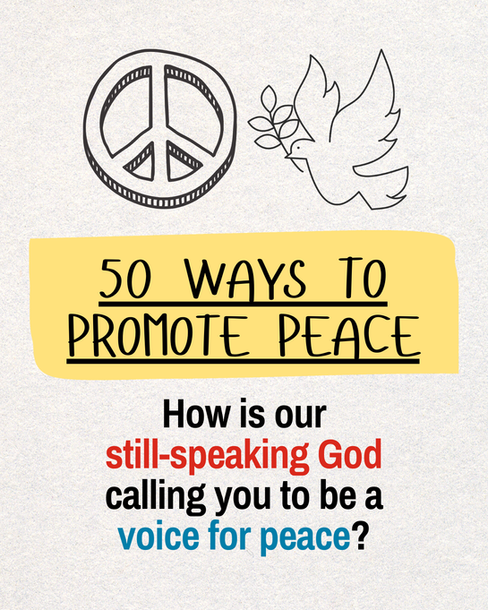June 2025 – Reflections from David & Jonathan
- Hawai‘i Conference Office
- Jun 30, 2025
- 4 min read
Our Conference Minister, David Popham, and Associate Conference Minister, Jonathan Roach, take turns sharing reflections each week in our Coconut Wireless e-newsletter. Read their reflections for the month of June 2025 here!

Peacemaking
Jonathan Roach, Associate Conference Minister
Again this weekend, the drums of war were echoing around the world. War, sometimes justified but more often unjustified, has been a reality of human existence for way too long. In the last 12 months, six current wars have EACH resulted in 10,000 or more combat-related deaths as well as untold suffering for millions living under constant threat.
Fear, violence, and war have gone hand-in-hand throughout human history. The earliest evidence of war with human-on-human violence is from a site over 10,000 years old and the earliest evidence of murder dates back over 430,000 years ago. Even our scriptures, both in the Old Testament and in the New Testament, are littered with murder, war, rape, domestic violence, child abuse, and even genocide. War and violence have been a human answer to our fears for as long as we have been around.
We often feel powerless in the face of war, but I want to remind us today that as followers of Jesus the Christ, we are called to be peacemakers. Although it is a small thing, I volunteer at Ku'ikahi Mediation Center in Hilo as a mediator to help people find better, more peaceful solutions. Over the last 12 months, I have helped prevent five court cases and while that isn't world peace, it is something. In addition, I have preached and taught about the violence in our scriptures. (If you need a resource, I recommend Caroline Blyth's Violence & the Bible for Normal People or John Dominic Crossan's How to Read the Bible and Still be a Christian). I am trying to be an instrument of peace. How is our still-speaking God calling you to be a voice for peace?
If you are looking for ways to be a voice for peace, click HERE (see below).
Speaking to Political Concerns
David K. Popham, Conference Minister
During the 'Aha Makua, we took up debate and voted for the resolution to oppose the 2025 immigration roll backs. While all present seemed to be in favor of the actions called for by the resolution, there was concern for some of the language in the opening Summary paragraph which specifically names the current D.C. administration. The debate was cordial and passionate, as is typical of our debates. It cannot be said that the members of this Conference are anything less than passionate, and I continue to praise Ke Akua for our deep connections to faith.
What struck me was that as we sought to speak spiritual truths to secular powers we were struggling with how to address a political issue without dipping into partisan politics. I can speak only from my perspective, but there was a moment or two when comments were those of partisan politics. Some recognized this and sought to bring attention to it. Unfortunately, we have been so conditioned by society's rancorous public debates that we followed the same lines of division into this debate.
By these observations I don't seek to shame anyone. I simply seek to observe how politics continues to inform the church instead of faith informing politics. Political debate is based on establishing dominance and emerging the winner. Faithful conversations should be structured by grace and compassion in which the goal is mutual support, even in disagreement. If political debate is about getting our way, faithful debate is about getting God's way. The last time I read the Bible (just this morning) I was reminded of the fruits of the Spirit (Galatians 5:19-21). What I understood today was when those fruits are absent from the public discourse then we are in the realm of partisan politics. When they are present then our faith is informing our politics.
Thinking about God's Timing
Jonathan Roach, Associate Conference Minister
I started writing a sermon this week about a fundamental aspect of our human existence: time. This sermon is based on Joshua 10 where God listens to Joshua's request for the sun and moon to stand still so that time would pause. It is a difficult passage with terrible violence, which might be why it is never included in the Revised Common Lectionary. But I am challenging myself this summer to dig into some very hard scriptural stories to understand passages that I have never preached nor heard preached.
This passage pushed me to consider time and how humans have abused the precious gift of time. Our scriptures highlight two different paradigms of time: Chronological time, which is a linear progression of seconds, minutes, hours, days, months, and years. It is a measured, structured understanding of time that contains some unfortunate concepts that many denominations have incorporated into their beliefs over the centuries. Contrast that with Kairos time, which is found over 30 times in the New Testament, and offers a concept of time not bound by a clock. Kairos time is an opportune moment in time. It embodies creativity, sensing God's inspiration, breakthroughs, epiphanies, sensing the Spirit's call to action here and now!
Many expressions of the Church—conversative, evangelical, and progressive—have all failed to live into a holistic Godly reality of time. Time is a gift, not a commodity. It is a paradigm of wonder that gives meaning to our earthly existences. And different cultures empower us to consider different understandings of time. I challenge all of us this week to reflect upon time. In the midst of the busyness of our daily lives and rushing to get ready for the 'Aha Pae'āina, ruled by chronological time, how do we recognize and make space for Kairos moments? How is our still-speaking God calling us to embody this holy, sacred gift?



















